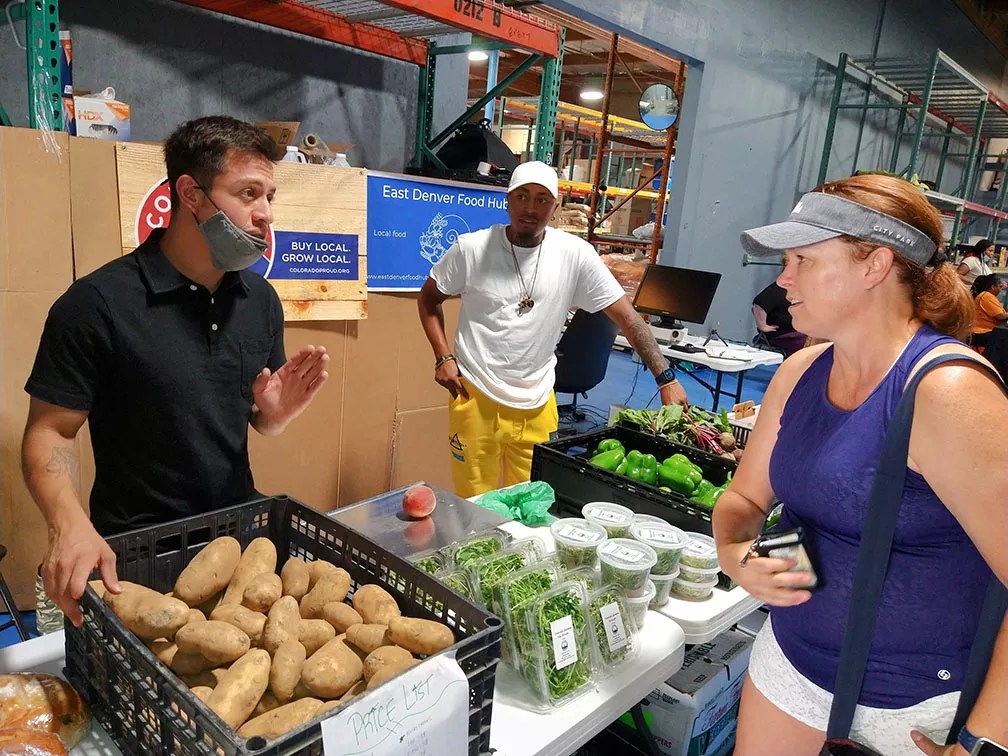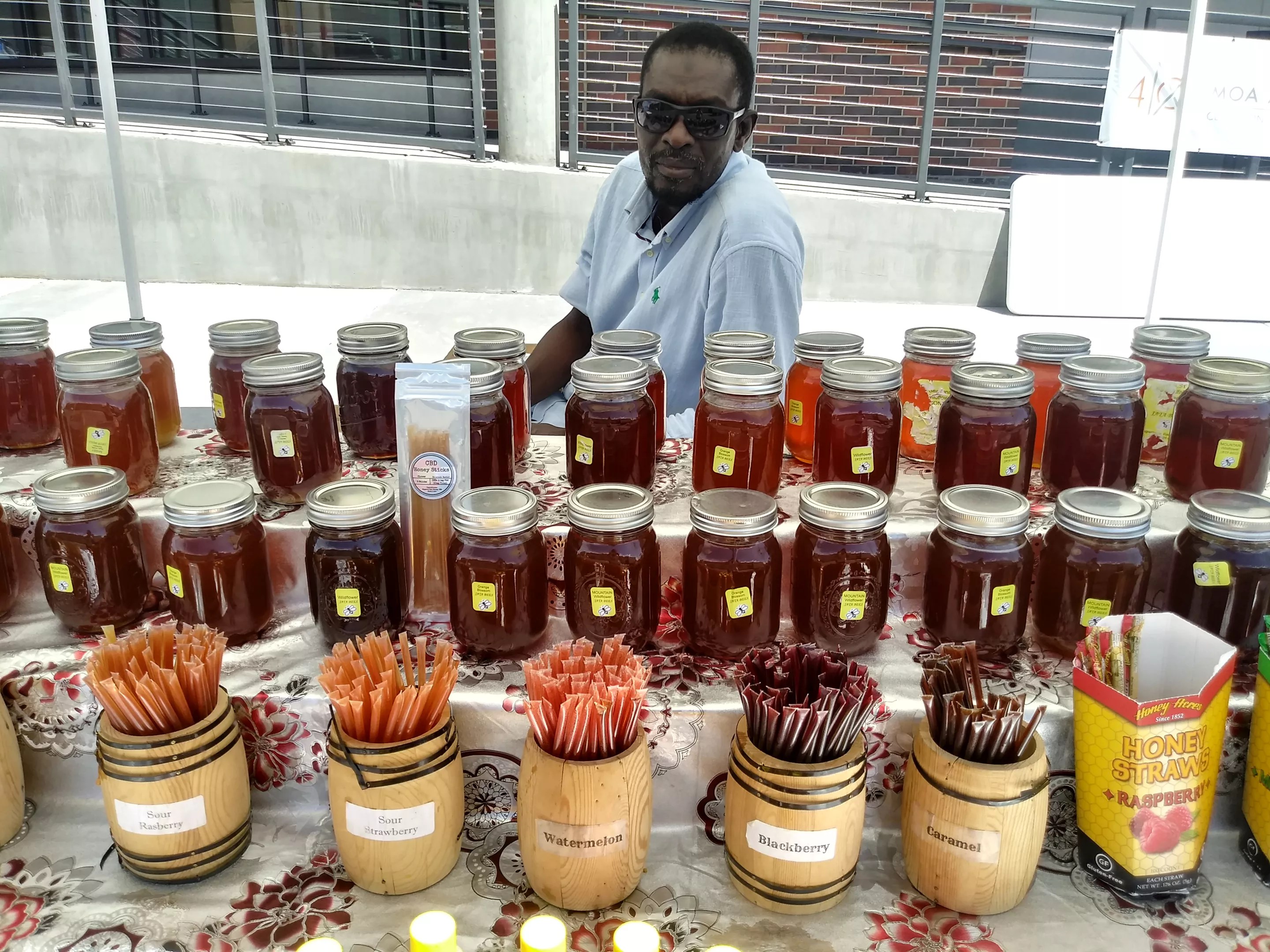
Anjanet Sayers

Audio By Carbonatix
The way that plants exchange nutrients to build soil is similar to the concept behind the East Denver Food Sovereignty Initiative (EDFSI), according to Roberto Meza, one of its members. Just as fungi, worms and other organisms interact to sustain and support natural food systems, the initiative seeks to help communities exchange resources and build strong and resilient food networks, he says.
The EDFSI is a coalition of community-based organizations that aim to support local farmers and entrepreneurs through fair prices and by bringing their products to neighborhoods in need and communities of color.
Its pilot program is the Noir Co-op Market, run by the father-daughter team of Shabasa and
Anjanet Sayers. The producer- and worker-owned marketplace will be at 2111 East 48th Avenue, and when it opens at the end of the year, it will be the first grocery store in the Elyria-Swansea neighborhood since the 1960s. Until then, Noir operates as an outdoor pop-up market every other Saturday.
The EDFSI grew out of the overwhelming needs faced by many food-access organizations during the early months of the COVID-19 pandemic, according to Councilmember Candi CdeBaca, a leader in efforts to address those needs. Groups that previously hadn’t focused on food access wanted “to be part of the solution,” she says
Together, the groups founded EDFSI and hashed out issues hindering food access, such as the reliance on grants and systems that don’t move quickly. “We couldn’t wait for nonprofits to solve our problems or private-sector grocers to get to the right populations,” CdeBaca adds.
During those same months, Meza and David Demerling founded the East Denver Food Hub out of a similar need. “We were responding to increased food insecurity and the vulnerability of the supply chain,” Meza explains. The action helped keep their microgreens farm, Emerald Gardens, in business as well.
The East Denver Food Hub serves as a distributor for local farmers with the goal of valuing growers, honoring land, “reclaiming our spaces and our food system…[and] ensuring that our communities are supported,” Meza adds.
By summer 2020, the organization was participating in events such as Lost City Market in Globeville, where customers were given the option to “pay-how-you-can.” And in 2021, the Sayerses started the Montbello Community Market in partnership with the East Denver Food Hub and two businesses: Khary’s Ready Made Meals and Emunah Soaps and Essentials, which is owned by Anjanet.

Anjanet (pictutred) and Shabasa Sayers will run the Noir Co-op Market, which currently operates as a pop-up every other Saturday.
Courtesy of Anjanet Sayers
The community market, which was held at the East Denver Food Hub warehouse, created the model for Noir Co-op Market. “Our main focus is strictly local produce, local makers, local craftsmen,” Anjanet explains.
In February 2022, after the EDFSI began visiting the 2111 East 48th Avenue location, the Sayerses and the East Denver Food Hub emerged as the “best positioned amongst us to lead” the creation of the market, CdeBaca says.
The East Denver Food Hub was also able to help support the project financially. It was awarded a grant from the Colorado Health Foundation that will cover a year of rent, as well as supplies and equipment to start the project. The group signed a five-year lease on the space in April.
Eventually, EDFSI hopes to own not only the building, but “also multiply it so that there are different access points in other communities,” Meza says. “This is essentially like a bicycle wheel that’s connected at the core…to basically build this decentralized network of different markets.” In addition to Noir Co-op Market, the group is planning to open new markets in Globeville and Five Points.
“It’s cool because it’s confusing,” CdeBaca says. Imagine if every single person had a backyard garden and their surplus was collected in a coordinated manner and distributed across the city to various distribution points. Everyone is a part of it, she notes.
But EDFSI is also specifically focused on bridging the gap between rural farmers and communities that struggle to access fresh produce. So that “they’re not isolated food communities,” Meza says.

One of the market’s aims is supporting local entrepreneurs and helping them grow their businesses.
Coutesy of Anjanet Sayers
In addition to running Noir Co-op Market, Shabasa will also be opening Noir Farm, which will focus on farming fish and raising livestock, among other initiatives. “We’re trying to be producers to wholesalers to retailers,” he explains. “A lot of these opportunities haven’t been available. My dad tried to open up a small grocery store and ran up against so many things in the Globeville neighborhood, [like] being told that he couldn’t do it because he was a person of color.”
So far, Noir Co-op pop-up markets have been growing in attendance. Organizers have been focusing on canvassing in the neighborhood and finding ways to let the community know about the every-other-week event. They’re also talking to people who come to visit the market and reassuring them that it’s a safe and welcoming space.
“A lot of people from the neighborhood would come and stand at the corner at first,” Shabasa recalls. “They were really apprehensive about coming over.” Ultimately, he wants to cater to what those community members need and want. The group is planning on taking surveys in the neighborhood and inviting customers to have a say on what the grocery store will look like and provide.
Noir Co-op Market is also meant to be an incubator for local entrepreneurs. Anjanet says that helping “people build income for themselves and encouraging people to build with us” is a priority.
CdeBaca’s office will sponsor a table at the pop-up that’s dedicated to youth entrepreneurs. When the Co-op is finished, there will be a commissary kitchen geared toward helping people in the neighborhood grow their businesses.
“This gives us an opportunity to put [Colorado] on the map for community resilience and wealth-building,” Meza adds. “It’s really addressing the challenges and developing solutions for everyone.”
Visit Noir Co-op Market at 2111 East 48th Avenue on Saturday, May 28.